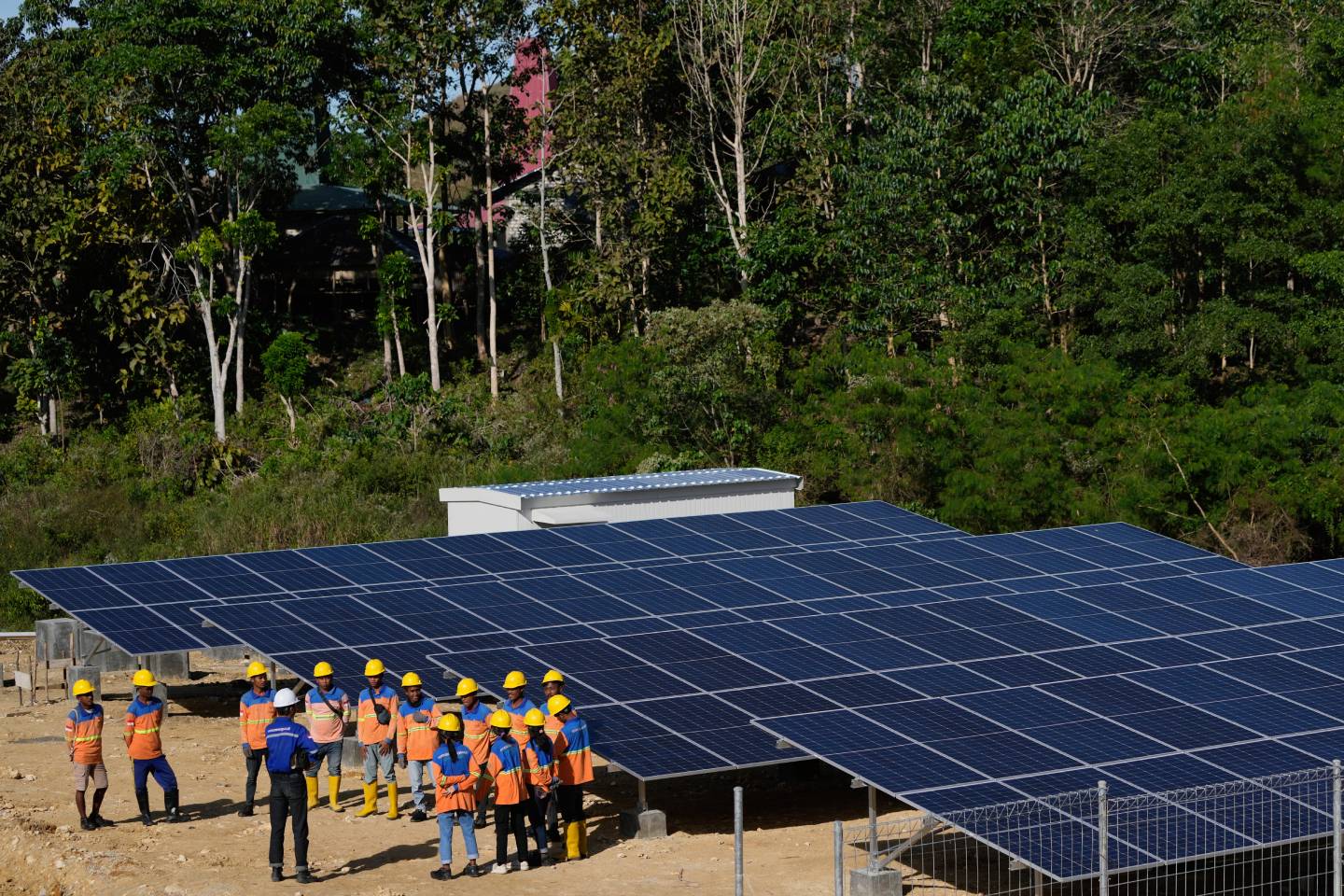From the Focus Group Discussion: Electricity Sale and Purchase Agreement for Hybrid Solar Power Plant (PLTS), 18 June 2021.
Indonesia needs to establish strong legal protection through specific regulations that involve all stakeholders as the basis for power purchase agreements for hybrid solar power plants. This was the broad conclusion of the online focus group discussion on this issue held on 18 June 2021 and organised by the MENTARI programme. MENTARI’s Muhammad Suhud (policy strand) moderated the discussion.
Can we achieve our targets?
Opening the event, Chrisnawan Anditya from the Ministry of Energy and Mineral Resources explained that Indonesia is committed to lowering greenhouse gas emissions and is aiming for 23 per cent renewable energy by 2025, and 31 per cent by 2050. While the renewable energy portion has increased over the last five years and had reached 11.2 per cent in 2021, he said, “To accelerate our progress towards this target, the government is currently focusing on developing solar energy on a massive scale through [utility scale] and solar rooftop power plants. This is done by considering the potential magnitude of solar energy in Indonesia and the construction period required, which is relatively short compared to other renewable energy technologies. Besides, the potential is huge – about 207,8 gigawatts.”
Developing renewable energy will not only work towards Indonesia’s nationally determined contribution target to cut emissions but also towards a universal or 100 per cent electricity access ratio, particularly in eastern Indonesia.
What about the regulatory environment for renewable energy?
Indonesia’s regulations on using renewable energy sources for the electricity supply need to be revised. For example, the Ministry of Energy and Mineral Resources regulations No 50 of 2017 and No 4 of 2020 do not cover hybrid power plant technology power purchase agreements. Issues that need to be considered relate to purchases by conditional direct appointment, cooperation schemes, tariffs, performance, assets, regulations, and environmental management, as well as specific issues like the local content requirement and its consequences (delayed supply), land, maintenance schedules, permits, contract periods, carbon credits and many more.
Cita Dewi, the executive vice-president for renewable energy at PLN, agreed that regulations relating to hybrid solar power plants have been non-existent and need to be put in place. In addition, the technical aspects of the technology for hybrid solar power plants, whether in capacity or commercial terms, need to be aligned with specifications already decided by the state electricity company, PLN.
In his response to this issue, Fabby Tumiwa, director of the Institute for Essential Services Reform, said that hybrid solar power plants could become the prime mover in the shift towards renewable energy in Indonesia. However, while solar energy is available all over Indonesia, deployment of the systems is limited based on the production capacity of the solar energy component suppliers in the country. The government local content requirements should be relaxed until the technology can be in one ‘package’ that includes the solar power plant equipment and the battery and provides maximum results.
Meanwhile, Paul Butarbutar, executive director of Indonesia’s Renewable Energy Society, hopes that the regulations can become the key to supporting and accelerating renewable energy for the national electricity supply. He said, “Strong legal protection will certainly make the funder, developer, and PLN, for instance, feel comfortable and not worry in operating hybrid solar power plants. On the contrary, if the regulation changes [do not] continue to happen, who will bear the impact?”
A brighter (and greener) future for all?
Ferry Triansyah, from the business development department at the Directorate General for Electricity, confirmed government’s commitment to providing good quality and inclusive electricity services at affordable prices. He said, “This is an opportunity for remote areas to obtain electricity. However, there needs to be more clarity – Is the battery included in certain components? Is it the same type as for hydropower? Besides [these issues], carbon tax also needs to be set up so that solar power plants using hybrid technology can be immediately implemented in underdeveloped areas that have not had electricity before.”
Meanwhile, David Lutman, Head of Low Carbon Energy and Infrastructure Team, British Embassy Jakarta, observed that Indonesia has the potential to become a superpower in the renewable energy sector with its variety of resources. He was delighted to establish a partnership with Indonesia to support the energy transition. He, too, believes the process will encourage inclusive economic growth, help eradicate poverty and provide access to safe and affordable energy for all while reducing carbon emissions.
MENTARI’s role
The low carbon energy partnership David refers to is the MENTARI programme, a collaboration between the British Embassy Jakarta and the Indonesian government through the Ministry of Energy and Mineral Resources.
Aloysius Damar Pranadi, MENTARI’s policy associate, explained that MENTARI supports Indonesia’s efforts towards eco-friendly recovery. He described the multiple effects of the transition to clean energy – not only to reduce harmful emissions and protect the environment but also to provide reliable, low-cost electricity services and the economic opportunities this opens up for all Indonesians.
MENTARI supports poverty alleviation through inclusive economic growth by developing new renewable energy in Indonesia. By following global trends in the renewable energy sector, the aim is to access and ultimately produce advanced technology locally and at a lower cost.







